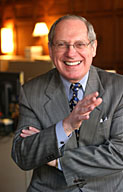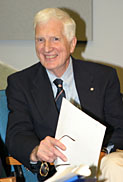Kaleidoscope
Tom Thompson: Capital guy
 Photo: Owen Egan
Photo: Owen Egan |
|
"I'll have been here 41 years next September. My guess is that this isn't the norm."
Not quite. Yet no one could accuse Tom Thompson of being complacent. The deputy director of development and director of campaign planning assumed dozens of positions at McGill, while being active in the community, for instance, as a Westmount city councillor from 1994 to 2001.
So what's kept him at the University this long? "There's no question that it's McGill that he loves so much," says Derek Drummond, vice-principal, (development and alumni relations). "You don't stay somewhere so long unless you're firmly committed to the place."
Must be true, since Thompson has worked at McGill most of his life. After obtaining a BSc in physical education (1958) and a teaching diploma (1961), he took a brief hiatus from his alma mater to teach phys. ed. in grade and high school.
He began teaching at McGill in the Department of Athletics in 1963, where he shook things up until 1970. He created the Department of Athletics Sports Information Office, nixed boxing, but introduced martial arts and weight training.
Thompson's work gradually merged to development and alumni relations, where he became director of alumni relations in 1974, leading to his present position in 1999.
Chancellor Richard Pound, who has worked with Thompson in various capacities since 1958, describes his colleague as unfailingly cheerful: "When you think of Tom Thompson you think of him smiling."
Pound also reports Thompson has the neatest handwriting he's ever seen. "But he continues to write the worst speeches ever written," Pound chuckles, noting he's rarely delivered Thompson-penned words. "Everyone loves teasing him about his speeches -- which are sort of corny."
Of course, Thompson has done more than write Pound's speeches. Thompson has organized or partaken in alumni events across North America and beyond, catering to McGill's 175,000 alumni scattered across the globe.
Since 1978, Thompson's department has raised $900 million in private funds. "For him fundraising is an art -- not a science -- and he's a great artist at it," says Drummond.
The trick to getting large gifts, Thompson says, is mixing the principal and other key McGill leaders with donors. "Personal testimony has the greatest impact," he says, declining to reveal what major gifts he's bagged himself.
Pound says it's natural to keep fundraising coups private. "Fund-raising success has many fathers," he says. "The bigger the gift, the more complex the relationship with the donor will be (and the more people will be involved)."
Thompson will certainly have the chance to outdo himself soon. He's currently gearing up for his fourth capital campaign, now in its silent phase, which should be officially launched in 2005.
He isn't daunted that McGill's next campaign will be competing with monster fundraisers, including one for the McGill University Health Centre superhospital. There are over 90,000 registered charities vying for funds across the country, he stresses. "You'll never find the perfect time to launch a campaign."
But he foresees that gifts of over $1 million will increase. During the 1974-79 campaign the university received one gift of $1 million, he says. "We predict we'll receive 72 gifts of $1 million or more during this next campaign."
McGill's greatest challenge will be its campus construction and renovation projects over the next five years. From the new music and arts buildings to the soon to open Trottier IT Building, McGill is refreshing its real estate at an estimated $175 million.
Yet the building boom requires more than money. "Do we have the key staff who have the respect of the construction community and who are skilled negotiators," he asks. "Otherwise there will be a new cohort of deans who are forced to become project managers."
For now, Thompson will worry about fundraising, since his greatest skill is his impeccable relationship with donors. Should Martlet House receptionists get a call from irate donors, says Drummond, "Those calls all go to Tom. He can calm down anyone better than anyone else."
Senior communications officer Vivien Lewin agrees, recalling a donor report that accidentally misidentified a benefactor in a photo caption.
"Tom didn't miss a beat and immediately called the donor and explained that exposure to their gift would be doubled, since a correction would later be issued," she says. "Tom Thompson doesn't know the name of fear."
After 41 years, tongues are wagging. But rumours of his imminent retirement are greatly exaggerated.
When Thompson does depart, says Drummond, "McGill will have lost a lot of its institutional memory. He's one damn fine operative, a great teacher and a huge asset to the staff at Martlet House."
Thompson counters some people think he should have retired long ago. Not yet, he won't, "not if I can still make a significant impact at McGill," he says. "You've got to be optimistic. If you're willing to work, you can effect change."
 |
||||
|
The more they complain [about their memory], the smaller the hippocampus. So, I say, 'Stop complaining.' |
||||
Scriver scholars
 Photo: Owen Egan
Photo: Owen Egan |
|
"The clinician-scientist serves two masters. There is a scientific master who pursues hypothesis at length and over time and in depth, in a public domain; and there is a clinical master who requires decisions to be made rapidly, often with insufficient facts, and in a private relationship with the patient. The scientist studies the disease the patient has, the clinician serves the patient who has the disease."
So said Charles Scriver, Alva Professor Emeritus of Human Genetics at McGill. Speaking at The Clinician-Scientist: A translator of knowledge symposium on April 10, the good doctor pointed out that these mediators of knowledge are becoming more and more rare in Canada, just as their special skills are increasingly in demand. The Scriver Family Foundation has established six scholarships worth more than $20,000 annually for aspiring MD/PhDs. The first six went to students at the University of Alberta, the University of Toronto, and Laval.
 |
||||
|
People are fed up with the debate, tired of the issue of 'are we in or are we out.' |
||||
SSMU balances the books
Like the arrival of the robins, the blooming of the tulips and the melting of the last dump of snow, McGill's libraries have their own harbinger of the new season. For the last five years in a row, the Students Society of McGill University has donated $500,000 to the library system. Last Thursday, representatives of the SSMU, the libraries and McGill administration were there to recognize the annual gift.
"It's become a rite of spring -- but not one we take for granted," said director of libraries Frances Groen in her opening remarks to the crowd that had assembled in the McLennan Library.
The first gift in 1996 came at an opportune time, said Groen, as university cutbacks were tightening belts across the board. The SSMU money allowed the library system to create an electronic classroom, hire students for tutoring and create a library equalization fund for the entire system.
Principal Heather Munroe-Blum was next up to speak. She noted that this ceremony was the first of its kind she had attended in her academic career.
"This is an important celebration. Libraries stand at the heart of the assets of the university," she said.
She then invited SSMU president Martin Doe to join her in unveiling a window that commemorated the SSMU's donations over the years. Doe took the podium and thanked the library staff and the university, which contributes matching funds to the project. He noted that the libraries are well used by students -- even as he spoke, students were cutting through the crowd of dignitaries.
"The libraries are key to students -- as we can see as they scurry in front of us here and as they work behind us in the 24-hour study space," he said.
Martin then introduced Fred Sagel who, as SSMU VP university affairs, ushered through the annual library fund donation. He credited the pioneering work of student senator Steven Erdelyi, who helped establish the fund in the mid-90s. He also gave kudos to the library director.
"When I was preparing for this talk I went through several old emails between my predecessors and Frances Groen, and I want to say thank you. Your dedication to this project has been consistent and tremendous," he said.
The SSMU has historically been generous to the university: since 1992, they have raised close to $11 million for libraries, bursaries, the new Brown student services building and the athletic complex.

